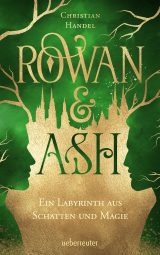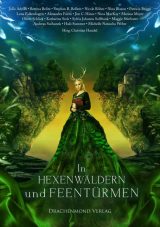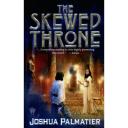 Recently Joshua Palmatiers first novel “The Skewed Throne” was published here in Germany. I liked it very much and invited the author for an eMail-interview to talk with him about his debut, his oridinary writing life and the fantasy genre in general.
Recently Joshua Palmatiers first novel “The Skewed Throne” was published here in Germany. I liked it very much and invited the author for an eMail-interview to talk with him about his debut, his oridinary writing life and the fantasy genre in general.
Please enjoy!
Interview with Joshua Palmatier
Maybe we could start with you introducing yourself?
My name is Joshua Palmatier and I’m a fantasy writer who also happens to have a PhD in Mathematics. I’ve been writing fantasy and science fiction since I was about 12 years old and finished my first novel while attending college. That novel hasn’t been published—nor the two that came after it—but the fourth novel I wrote, The Skewed Throne, caught the attention of the editors at DAW Books and that launched my career. I currently have three books out in the USA, all of which are being translated and released in Germany from now until August of 2010. All of the books are part of the same series, The Throne of Amenkor, which includes The Skewed Throne, The Cracked Throne, and The Vacant Throne. The German titles are Die Assassine, Die Regentin, and a third that is as yet untitled. The most common word used to describe The Throne of Amenkor books is “gritty”.
Without giving too much away: How would you describe The Skewed Throne in just a few sentences?
The Skewed Throne is the story of a young girl, Varis, who is initially barely surviving in the slums of the city of Amenkor. She has a special power that has allowed her to survive in the slums, and that power comes in handy when she meets Erick, one of the assassins controlled by the Mistress of the Skewed Throne. Varis is trained as an assassin under Erick and that allows her to escape the slums. Eventually, she’s hired to kill the Mistress herself . . . but to get to the Mistress she’ll have to get past the Skewed Throne. And the Skewed Throne knows she’s coming . . . and it’s insane. Bwahahahahahaha!
It’s the first installment of a series, isn’t it?
Yes, The Skewed Throne introduces the reader to Varis and the port city of Amenkor. The two sequels, The Cracked Throne and The Vacant Throne, deal more with the city and expand the world to include a larger portion of the coast. You also learn more about the Throne itself and its history.
Could you tell us a little bit about the main characters of the novel.
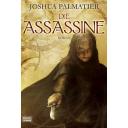 I like Varis as a character because she’s very practical and she’s willing to do whatever it takes to survive. And yet, she’s vulnerable and at heart a good person. She’s simply been thrown into circumstances where being “the good person” isn’t always allowed in order to survive. She does some things she’s not proud of and she’s forced to deal with those things on a daily basis. She’s young (she starts off at age 14 and the series finishes with her nearing 18), tough, resilient, and yet can be hurt. I hope she’s comes across as neither “good” or “bad,” but a realistic mixture of both.
I like Varis as a character because she’s very practical and she’s willing to do whatever it takes to survive. And yet, she’s vulnerable and at heart a good person. She’s simply been thrown into circumstances where being “the good person” isn’t always allowed in order to survive. She does some things she’s not proud of and she’s forced to deal with those things on a daily basis. She’s young (she starts off at age 14 and the series finishes with her nearing 18), tough, resilient, and yet can be hurt. I hope she’s comes across as neither “good” or “bad,” but a realistic mixture of both.
How long did it take you to write The Skewed Throne?
It took me about six months to write the first draft of The Skewed Throne. I then revised it for myself, then again for some potential agents, and yet again for my editor before publication. Overall, counting those revisions, it probably took a year.
Why Fantasy? What is your personal opinion – what makes this genre so attractive to readers – and writers as well?
Oh, I’ve been reading fantasy since I was 8 or 9 years old, and the moment I picked up that first book by Andre Norton, I was hooked. There was no question when I decided to write that it would be in the fantasy field. I think it’s because there’s so much freedom in the field. You can, in essence, do whatever you want, create whatever creatures you want, build a new world, a new religion, an entire culture . . . the possibilities are endless. Writing that world in such a way that it comes alive and is REAL to the reader is the challenge, and I think that challenge is also part of why writers write. Getting across that sense of wonder at what you have imagined, and having the reader experience the awe that you felt as you wrote or created it . . . that’s what draws me to fantasy.
And why that story? Do you remember what inspired you to that certain plot?
Ah, the Skewed Throne itself was the genesis of the story. Well, a combination of the Throne and the White Fire. Both of these magical elements came about while I was writing one of those previous unpublished books. In one of those, I had my characters going through an ancient museum, so I needed to fill that museum with a bunch of cool sounding artifacts. One of the characters walked by this Throne that couldn’t possibly exist—the highest part of the seat was supported by the shortest leg, like an Escher painting. When they approached it, they heard whispering voices, thousands of them, and so they freaked out and fled. That image—of a warped throne with voices trapped inside of it—remained with me long after I’d finished that book. Eventually, I had this image in my head of a young girl sitting on a boat in the harbor of a city this immense White Fire emerged from the west and washed over everyone in the city without burning anything, yet affecting everyone in various ways. The two ideas—the Throne and the White Fire—merged and formed the basis for The Skewed Throne.
Giving your blog, you seem to be very open minded when it comes to correspondence with your fans. Is that something you like?
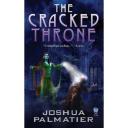 I enjoy hearing from my readers and interacting with them during the long periods when a book has been released and I’m working on another project. The blog and webpages give the readers a chance to find out more about me on a personal level as well, and keeps them updated on where I am in the new projects and what they can expect to see in the near future from me. So yeah, I do like interacting with the fans both online and at conventions.
I enjoy hearing from my readers and interacting with them during the long periods when a book has been released and I’m working on another project. The blog and webpages give the readers a chance to find out more about me on a personal level as well, and keeps them updated on where I am in the new projects and what they can expect to see in the near future from me. So yeah, I do like interacting with the fans both online and at conventions.
Can you remember what your first story (or novel) was about? And how did you realise you have a talent for writing?
My first novel was set in the same world as The Throne of Amenkor series and was called Sorrow. It was a rather standard fantasy, about a group of adventurers who go off on a quest to retrieve a lost object in the hopes of saving themselves from a demonic Horde threatening to annihilate them. It had some good parts to it, and my editor has talked about going back to it and revising it for possible publication, but what it mainly allowed me to do was explore and create the world that became the setting of the Throne books. It also helped me develop my writing skills to a level where what I wrote could be published. It’s essentially where I taught myself to be a writer.
Anything you really loathe during the creation of a novel?
There are many things actually, but the biggest is the middle of the novel itself. There’s usually a point about halfway through where the plot seems to slow down and suddenly, as a writer, you think that the book is going to fail, that you’re a hack, that you couldn’t write yourself out of a cardboard box without a blowtorch, and then now, with this book that’s only half finished, EVERYONE WILL KNOW!!! You keep writing, of course, and eventually all of those things that you thought couldn’t possible come together to form a coherent plot DO come together and you see how it all works out in the end . . . but that section in the middle, where you’re fumbling along almost blindly . . . those moments are hell.
Did your publisher ask or even demand you to make rapid changes on your books?
Every publisher asks the writer to make revisions to the novel at some point. Sometimes those revisions are minor and sometimes they require you to rip the book apart and stitch it back together again. In either case, they almost always want you to do the revisions as rapidly as possible. Most of the time, the deadline given is reasonable, but as a writer you always feel stressed and always wish you had more time.
Maybe you could tell us a little bit about your process of writing a novel? How’s an ordinary working day like?
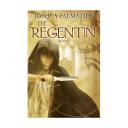 Well, I do have a day job, so that keeps me from writing as much as I’d like. I have my teaching schedule set up so that I’m finished with the day job by around noon, which means I can spend the afternoon writing. I usually sit down and get a few hours in at that point whenever possible. During the summers, when school is not in session, I will write through the morning, take a break for lunch, and then write in the afternoon as well. This is when I get the majority of the books written, since I have nothing else interfering with my time.
Well, I do have a day job, so that keeps me from writing as much as I’d like. I have my teaching schedule set up so that I’m finished with the day job by around noon, which means I can spend the afternoon writing. I usually sit down and get a few hours in at that point whenever possible. During the summers, when school is not in session, I will write through the morning, take a break for lunch, and then write in the afternoon as well. This is when I get the majority of the books written, since I have nothing else interfering with my time.
What do you feel is the key element in creating vivid worlds and believable characters?
I think the key to any novel is the characters involved. The way in which the reader experiences the world and gets to know the characters is through the character actions, so showing the reader the character’s everyday life is the best way to make the world vivid and real for them. It’s also the best way to show the character’s emotions and makes them multi-dimensional. I try to let the readers live through the characters whenever possible, and keep the narration and exposition of the novel to a minimum.
Authors often do get asked for writing advices. Are there any you on the one hand share generously – and on the other hand you realize that you have to remind yourself constantly about them when you’re writing fiction?
Oh, writing is a constant battle and constant challenge, since there’s so much involved in creating a world and believable characters in the first place. It takes a lot of work to get the basics down, and then after that you have to continually work on refining all of those skills. So I’m definitely reminding myself often to work on techniques. I know for The Skewed Throne I was trying hard to really get into the character’s head, so that readers could really get to know Varis as closely as possible. In my current work in progress, I’m trying to focus on worldbuilding, making the world as unique and clear and interesting as possible.
What else is planned from the author Joshua Palmatier?
Lots of projects. *grin* I have a short story coming out in an anthology called Close Encounters of the Urban Kind, released next April. This is my first short story sale, so I’m excited about that and hope to write more like this in the future. I’m starting a new series next May as well. I’m currently talking to my editor about an additional series (the current work in progress) and hope to sign contracts on that soon. Plus there are a ton of other books in my head urging me to write them NOW!
Can you tell us a little bit about your upcoming novel project Well of Sorrows?
Ah, Well of Sorrows is the first book of a new series set in the same world as the Throne of Amenkor books, but it doesn’t involve any of the same characters. It isn’t even set on the same continent. In this series, I’m using magic to play around with the idea of loss, grief, immortality, and time. It’s been a challenge to write simply because it isn’t focused on a single character, the way that the Throne books were. There is a central character of course, Colin, but we also get some other point of view characters, since the plot itself doesn’t center completely around Colin. I also introduce a few more cultures and races, some not as . . . nice as others. It’s a bigger novel, broader in scope, verging on epic. I’m hoping that those that like Varis will enjoy Colin and the rest as much, if not more.
Any plans to visit Germany at some point in the future?
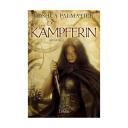 I’d love to visit Germany! In fact, I had some plans to come this past summer, but time and circumstances didn’t work out. I’m thinking about taking the time to visit next summer though, once all three Throne of Amenkor books are available in German. I need to research some of the science fiction and fantasy conventions held in Germany and try to hit some of those at the same time.
I’d love to visit Germany! In fact, I had some plans to come this past summer, but time and circumstances didn’t work out. I’m thinking about taking the time to visit next summer though, once all three Throne of Amenkor books are available in German. I need to research some of the science fiction and fantasy conventions held in Germany and try to hit some of those at the same time.
If you could meet a fictional character (from your own work or another) who should it be and why?
Hmm . . . I’m not sure about this question. I’d love to meet Varis of course, but she’s fairly dangerous. In the appropriate setting she’d be fine though. *grin*
Is there a novel (from another author) you wish you had written?
Oh, there are tons of authors out there that I strive to be. The two that leap to mind first though are Guy Gavriel Kay and Tad Williams. I loved Tad Williams’ Memory, Sorrow and Thorn trilogy, especially Stone of Farewell. And I have yet to read a Guy Gavriel Kay book that didn’t make me wish I had his skill at creating evocative prose.
How do you feel the fantasy genre did change within the last years. And do you think there’s a trend?
I think the biggest change in the genre would be the emergence of “urban fantasy” as a driving force behind the industry. I personally don’t write any urban fantasy novels, and don’t really have the desire to, but it’s certainly taken over the genre. In time it will fade, of course (although it will never disappear). As for the next trend . . . well, if I knew that I’d be writing it and I wouldn’t be telling anyone else what it was! *grin*
Thank you so much for your time and for being so kind to answer these questions!
All the best for your novels and both for your working and your private life!
Joshua Palmatiers Website can be found here!
